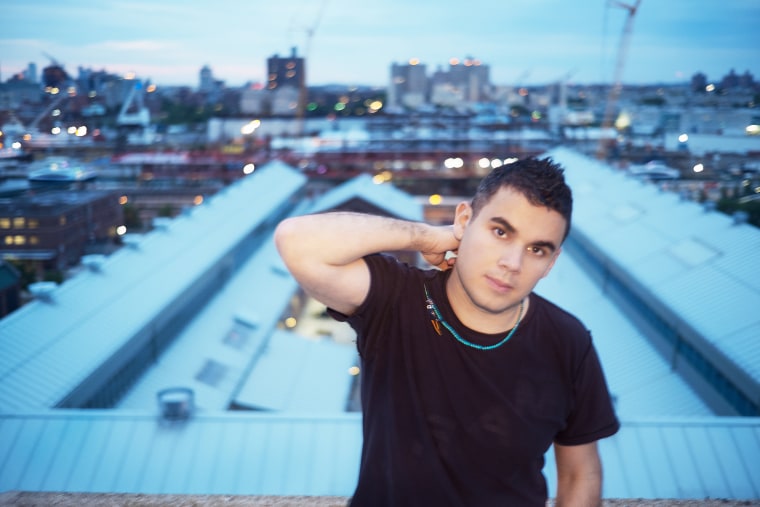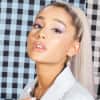 Alex John Beck
Alex John Beck
Because most of the queer stories we get to see in the world are still pigeonholed into being about coming out or dying, it still feels really great to hear or see art that's about queer existence. While he was a member of Vampire Weekend and on his solo material, Rostam has made exactly that — gorgeous songs about love and life that are queer but do a lot more heavy lifting than just that.
His new album, Half-Light, is a wide-ranging collection of swirling songs about introspection, boys, and his experience as a child of immigrants. Musically, it’s a natural extension of the dizzying pop he's helped make as a gifted producer for acts like Frank Ocean, Charli XCX, and Carly Rae Jepsen.
Earlier this month at the Standard Hotel in the East Village, Rostam sat across from me on a blue chaise lounge and peeled back some of the layers of his complex work, yet managed to keep a bunch of secrets under wraps. While responding to my questions, he spoke slowly and carefully, as if making sure not to play any wrong notes. His answers were sometimes as twisty as his songs, but his words felt as fresh and essential as his music.
I wanted to talk to you about the meaning behind “Bike Dream” from Half-Light. There’s the lines in the chorus about being with multiple men and then later in the song, there’s “I’m pulled away, I see another of myself who’s found true love and happiness.” I think all the multiplicity is a fascinating concept but I was wondering if you could explain it a little bit.
I can, and there is one specific thing that I would like to clear up, that the two boys referenced are not two literal boys. They come out of that phrase. I used it out of a desire to talk about when you’re with a person, you might want to be two different people at once and have the advantages of being two different kinds of people at once. I like that the song could point in any number of directions, that it was almost like a prism — how it could be about facing yourself or another person. It could be talking about a relationship between a boy and a girl. I could be talking about a relationship between two guys. I had very specific associations with all of the lyrics that I wrote in the song, but I liked that there was an openness to it. So at once there's a very specific set of associations that I carry, and then I'm trying to communicate something, but it's not specifically one story that I want to tell. I don't need people to hear it only one way. I don't want people to hear it only one way.
I was in a Slack channel with my a few of my co-workers — we're all gay men — before this interview, and a lot of them were very passionately talking about how the three of us—
A Slack channel?
A Slack channel.
Oh, I know about Slack, but I've never used it. I'd like to make an album with Slack one day. I'd like to use it as a collaborative tool. I know about it because I have friends that work in tech, and I guess you can use it in any job.
“My goal is to make music that anybody can hear and feel moved by. But that said, I do feel like there are specific people for whom I’m making these songs.”
We were talking about how we love your music so much because it's really nice to hear songs about gay love. Although you are not the first gay man to make music—
I'm definitely the first gay man to win an Oscar. [laughs]
Definitely.
I'm the first gay man to win an Oscar. I also know for a fact that I'm the first gay man to win a Grammy. [laughs]
I can definitely confirm that, that is true. [laughs] But there is a certain quality to your music that we all feel like it speaks to us in this intense way. I was wondering if in writing love songs like you're conscious of that and what your thoughts are about writing gay love songs in general.
I've said this [before] in an interview, and I think it's important to say it again. I think that all music is inherently political, and, at the same time, I'm interested in the politics of inclusion not exclusion. So I think that my goal is to make music that anybody can hear and feel moved by. But that said, I do feel like there are specific people for whom I'm making these songs.
On that same note, the song "Rudie" is really interesting, because it seems like a song that a lot of people can relate to. I was wondering what the inspiration for it was.
I was thinking about this word “rudie,” which came from the Jamaican word rude boy, which became rudie and traveled to England, I guess maybe in the ‘70s or ‘80s, because The Clash started using it in songs. But then coming from a completely different angle, Rudie is also a town in Iran, and it's a name in the Iranian culture. And I like those connections, and I saw some parallels between Jamaica and Iran, and I didn't want to make explicit connections, but I wanted to weave a story together that was about somebody who needs to leave the place that they're from in order to survive. I know people that have heard the song completely differently. I guess I wanted that to be kind of like something you might need to read between the lines to get to, but I think from the line "Mama knew that rudie was not like all the other boys" that I think you can kind of start to put together the story.
I wanted to ask you about your merch. I have the black long sleeve top with your name in Persian in bold on it. I was wearing it on a visit to a label, and the security guards were super excited to see it, asking, "Oh my god. Who is Rostam?" I've also gotten rude looks from people on the subway. What was your thinking behind having your name written in Persian on those shirts and on your album cover?
My parents left Iran after the revolution in '79. The go into France, and then they came to America because they wanted me and my brother to be able to feel like we had a place to live, and they didn't feel like they could have that in France, but they felt like they could have that in America. I think they wanted us to be able to feel Iranian and American at once. One of the things they did when they got to America was they started a publishing company, and the book that they published the most copies of, by a country mile, is my mom's cookbook. But they've also published books about Persian culture and Iranian literature with a focus on Persian and Iranian culture that does not specifically relate to Islam. I [think] they felt that the only window a lot of Westerners had into Iran was through Islam, and they wanted to show that there's a whole other side.
So their company, Mage Publishers, it's mission statement is "Bridging East and West," and I I'm interested in doing a similar thing.sing my name in Persian as my logo, I guess I recognize that there's a confrontational aspect of doing that. And what I'm interested in is combating a narrow perspective of how people with roots in the Middle East are seen in America.
I think even my album cover, which puts these blocks of really bright color in conjunction with Persian calligraphy, I see it as defiant in some ways. I considered having the album title on the cover, and I considered having my name in English on the album cover, but I think it felt more powerful to only have Persian writing on the cover.
“What I’m interested in is combating a narrow perspective of how people with roots in the Middle East are seen in America.”
I also wanted to ask about your appearance in the video for “Boys” with Charli XCX and how that came about. What it was like being in that ensemble of crushes?
Charli's someone that I've known since the beginning of 2014. I've known her for longer, but I think we became close at the beginning of 2014 where we had a couple days booked to write songs together for her forthcoming album, and we just kind of started living together for a couple of days. It was really funny, because we went to see a Miley concert, and then we came home and we wrote a song together, and eventually that song was on a Hunger Games soundtrack. We finished two other songs, which have never come out, and then later on we did this song called "Need Your Love," which is one of my favorite things that I've ever done, and it was on her album Sucker."
Outside of collaborating we've stayed close friends, and when she told me about the idea for the video, I was like, "I'm totally down." And she was like, "Can you help me get some people involved too that I want to get for this?" And I was like, "I'm totally down to help too." So what she had was a really specific concept. She was like, "I want to turn the male gaze around." And she had this PDF document that she'd made that was super stylized and really elaborate and exacting about what the video would be. She was like, "I'm gonna send you this thing. I made this for my label so that they would give me the money to make this video."
She really took her time. She started in April, and she shot over a long period of time. The section I shot was actually on the Coachella Festival grounds, so it was during Coachella that we shot. It made me feel good to see her realize a vision and be a small part of that.
I feel like you two are an evenly matched pair. Musically I feel like she is a very high energy intensity, and you seem to be pretty mellow.
It's possible.
What is it about her that you like working with her?
One thing a lot of people don't know about Charli is that her mom is a Ugandan Indian. So I guess I feel a kinship with her, because she has roots in the continent of Asia, and it is part of her identity, and it's something that we share. I feel close to her in that way. Then I think we're both pretty driven. I think we take music making seriously, so that's our basis. Maybe she takes parties a little more seriously that I do. I try not to take partying seriously anymore, but she still likes to do serious partying. I can't really keep up with it, but I can try.
You have done solo stuff before, but this is being called your first solo album. I was wondering if there were any kind of reservations about “going solo” at all.
I think what makes this record very specifically my record is that the lyrics tell stories that wouldn't make sense coming from anyone else. So I do feel it was important to make this record and release it under my name. I think it just took time for me to get to that place where I was comfortable putting together a whole album, because there were things that I knew I wanted to say dating back ten years, but I think it took me time to figure out how to say them.
 Alex John Beck
Alex John Beck
There's been a lot of talk about the next album from Vampire Weekend, and at times you have said that you were going to be involved. Is that still true? And are you still working with them?
I like there to be some secrets.
That's fair.
So that's one question that I kind of leave unanswered in interviews. I work with a lot of artists, and I don't like to talk about it until it comes out.
With working with a lot of artists, what do you think makes you so adaptable as a person in the studio?
I think when I work with artists, I'm at their service, and I'm at the service of either their vision or a vision that we find together and we share. When the [Haim] song "Walking Away" came out and people told me that they could hear my production sensibility in it, in some ways I was surprised, because I really felt like I was letting Haim realize their vision, and I was helping them realize that vision, and it's something that I love to do, and I think it's something that I'll continue to do throughout my life.
I think maybe it's just about trust, and also it's about the fact that it's very rare that I get in the studio with people that I don't know. I have some kind of friendship first, and then we end up in the studio together. The one exception to that is Carly Rae Jepsen. I was a fan, and I reached out through the most normal channels, like management, and she came to my studio and the first day she ever came to my studio we started working on "Warm Blood" or what became "Warm Blood," and that ended up on her record. So there are exceptions, but mostly I think the people that I work with, it comes through friendship and mutual trust.


